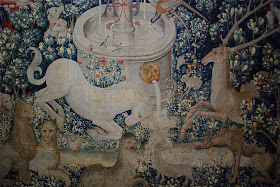 |
| Spotted along Central Park West in November 2010 |
The individual tapestry hangings known as "The Unicorn Tapestries" are some of the breathtaking pieces of Gothic art showcased at The Cloisters, a branch of the Metropolitan Museum of Art located in the northern tip of Manhattan. Originally designed to protect medieval rooms from damp and cold weather, these tapestries from the late Middle Ages are woven in fine wool and silk with silver and gilded threads. They vividly depict scenes associated with the myth of the elusive, magical unicorn, which has been around since Ancient China and yet still appears in modern culture. Captured above are some of the actual unicorn tapestry hangings and doorway relief in a display room devoted to the unicorn tapestries at the Cloisters, as well as a "missing unicorn" sign that appeared in Manhattan streets two years ago.
Information from The Unicorn Tapestries by Sarah J. Albertini Danielle M. Pastor:
The tapestries were thought to have been designed in France and made in Brussels. Therecipient of these magnificent tapestries are unknown. Some clues to the identity of this person has been left behind in the tapestries themselves. Much has been made of the initials A and a reversed E that are joined together by a bow. This was an insignia of Anne of Brittany, twice queen of France. The same theory suggests that in the sixth tapestry, the lovers who look at each other are Anne and Louis XII.
Another equally plausible theory is that the noble La Rochefoucald family were the original owners. This is because in the third tapestry, the initials F and R are sewn into the sky. Also the A and E initials can be linked to Antoinette of Ambroise, wife of Francois La Rochfoucald.
The theme of the tapestries is the fight between the unicorn and the humans who peruse it.
The first tapestry, The Start of the Hunt, introduces us to the hunters but not the unicorn. The hunters are not dressed for hunting, but rather in clothing in rich colors and textures.
The second tapestry, The Unicorn at the Fountain", is where the unicorn uses his magical horn to remove the snake's venom from the water. It is here that the theory begins that the unicorn is a symbol of Jesus Christ. Here the unicorn, Christ, saves all from the snake's poison, Satan. Even the humans who were hunting the unicorn are awed by this act.
The third tapestry is The Unicorn Leaps the Stream. Here the serenity of the second tapestry is abandoned as one looks at a highly charged action scene. The hunters now have ugly and cruel faces--symbolizing the persecutors of Jesus Christ.
For the fourth tapestry, The Unicorn Defends Himself, the unicorn becomes savage, kicking and butting people and animals. A new comer to the scene, a man with a horn, is thought to symbolize the archangel Gabriel.
Unfortunately, the fifth tapestry, The Unicorn is Captured by the Maiden", is now in fragments because of mishandling over the years. According to tradition, the unicorn can only be trapped by a virginal maiden. The enclosed garden that the two are in, was a medieval symbol of chastity. Also, the apple tree in the center of the tapestry has many religious meanings. The most obvious is a reminder of the Fall of Adam and Eve, hence suggesting that the unicorn, Christ, and is the Redemption after the Fall.
The sixth tapestry,The Unicorn is Killed and Brought to the Castle is wrought with emotion. The overall scene is centered the slain unicorn, who is bleeding in the upper left hand corner. All in the scene seem to be awed and shocked by the sight of the slain beast being brought towards them.
The seventh tapestry, The Unicorn in Captivity is the most famous of all the Unicorn Tapestries. The unicorn here is miraculously alive again. In this tapestry he rests chained to a circular wooden gate. The rise unicorn is symbolic of the risen Christ. However, since the unicorn is chained there is some confusion to this symbolism. One theory is that the unicorn, like Jesus Christ, is linked to life or humanity forever. The other theory is that the unicorn symbolizes a bridegroom secured by his lover.








I Love your Blog ,thank you !
ReplyDeletealways facinating.
ReplyDeleteAwesome. JanUK
ReplyDelete